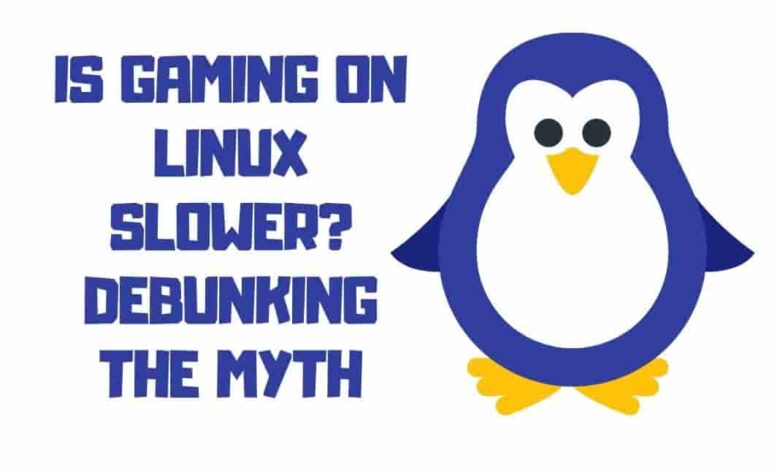Is Gaming on Linux Slower As Compared to Windows

Gaming has always been a dominant force in the world of technology, but the question remains: Is gaming on Linux slower? Let’s dive into this complex issue, analyzing different aspects of gaming on this open-source operating system. By the end of this article, we’ll have an answer to this intriguing question, so buckle up and let’s get started!
Key Takeaways:
- Though playing on Linux has historically been slower, it’s catching up with Windows, and the gap is gradually narrowing.
- Steam, Vulkan, Wine, and improved driver support significantly propel Linux gaming forward.
- Continued efforts in optimizing Linux for playing are critical for its future success.
The Truth: Linux Gaming Slower?

While it’s true that Linux may not have the warp-speed gaming powers of Windows, don’t discount its impressive abilities – it’ll keep you amused for hours without inducing hair-pulling frustration. Although some games might not run as smoothly, Linux continues to make significant strides toward closing the gap.
To ensure an optimal playing experience on Linux:
- Use the latest graphics drivers
- Opt for a gaming-centric distribution (like SteamOS, Ubuntu GamePack, or Pop!_OS)
- Choose native Linux games or games with excellent Proton/Wine compatibility ratings
- Tweak settings to optimize the system for playing
Linux: Complex but Compelling
Linux, the superhero of operating systems, is an open-source wonder revolutionizing the tech world as we know it. However, it is often caught in a heated debate regarding the gaming experience it offers compared to other operating systems, mainly Windows.
Here are a few Points Why One Might Think Linux Lacks In Gaming Performance:
- Lack of games designed specifically for Linux
- Limited driver support for graphics cards
- Irregular game patches and updates
On the contrary, Linux has its fair share of supporters who argue that it can offer a similarly excellent, if not better, gaming joy with the appropriate configurations and software optimizations.
Battle of the Operating Systems: Windows vs. Linux
Get ready for a showdown of epic proportions, gamers! It’s time to pit the titans of operating systems against each other and determine which one indeed dominates the gaming world. Buckle up and grab your controllers because this will be one wild ride!
| Comparison Point | Windows | Linux |
|---|---|---|
| Game Availability | The vast majority of games designed for Windows | The lower number of native games and higher reliance on compatibility tools |
| Drivers and Support | Direct support from companies (NVIDIA, AMD) | Improved support, but still not on par with Windows |
| Customizability | Limited, due to a closed ecosystem | Highly customizable, thanks to the open-source nature |
| Optimization | In-built support, tools like DirectX | Requires manual optimization and use of third-party tools |
| Cost | High, due to the license fee | Free |
The Growing Potential of Linux Gaming
Hold onto your controllers because Linux is not just catching up to Windows – it’s about to unleash a digital revolution in the gaming world! Join the fun and discover what’s behind this explosive growth.
- Steam: Valve Corporation’s digital distribution platform, Steam, is perhaps the most significant reason behind the surge in Linux popularity. Smoke has made gaming on Linux much more accessible, with support for native Linux games and compatibility tools, like Proton, that facilitate playing Windows games on Linux.
- Vulkan API: Video game developers are adopting the Vulkan API, a cross-platform 3D graphics technology that can improve performance on Linux platforms.
- Wine and Lutris: Compatibility layers such as Wine and software like Lutris have allowed Linux users to run Windows-exclusive games on their systems with minimal effort.
- Better Graphics Drivers & Support: Over time, both NVIDIA and AMD have increased their support for Linux and are now offering optimized drivers, making the playing joy smoother.
Frequently Asked Questions
Is Linux Gaming performance Better than Windows?
While Windows generally has better compatibility with the latest games, Linux has made significant strides in this area. With the help of Steam’s Proton layer, Linux users can now play a wider variety of games. However, performance may vary depending on game optimization.
What are the Disadvantages of Linux for Gaming?
One major challenge for Linux gaming is the fragmentation and confusion surrounding graphics drivers. Both proprietary and open-source drivers are available for AMD and Nvidia graphics cards, but their integration can be complex. Additionally, many games require an extra compatibility layer to work on Linux.
Does Linux get more FPS?
While Linux has made advancements in gaming, it generally does not deliver as many frames per second as Windows. This is partly due to the lack of comprehensive video drivers for Linux and the need for an additional compatibility layer for many games.
Does Linux use less RAM?
Yes, Linux generally uses fewer resources, including RAM, than Windows. This is due to its lightweight kernel, the absence of many background processes, and a lack of bloated applications.
Why Linux is not popular for Gaming?
Linux has limited support for popular gaming titles, which can be a deterrent for gamers. While there are workarounds and solutions, these often require more technical knowledge or additional software, making it less user-friendly for gaming.
What percentage of Gamers use Linux?
The number of gamers using Linux has recently increased. As of July 2022, the market share for Linux-based gaming on Steam reached 1%, a significant increase from the previous 0.8 to 0.9% range.
Is 4 GB RAM Good for Linux?
Yes, 4GB of RAM should be sufficient for most Linux distributions. Linux is generally more efficient with resource usage than Windows, and lightweight desktop environments like Xfce or LXQT can run smoothly on systems with 4GB of RAM.
Conclusion
Ultimately, the answer to “Is gaming on Linux slower?” is both yes and no; it’s slower in some aspects, but the difference can be negligible with the correct configurations. The world of Linux gaming will only grow, and who knows – it might even outshine other operating systems in the future! So, are you ready to join the Linux gaming revolution?

